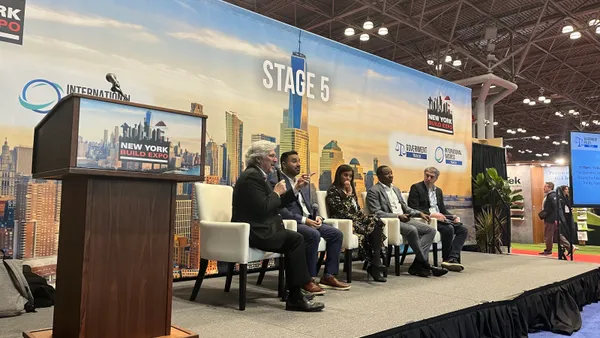Dive Brief:
- The Atlanta City Council unanimously approved a pledge to commit the city to reaching 100% renewable energy by 2035, according to The Atlanta Journal-Constitution. Municipal buildings, however, must reach that goal by 2025.
- Atlanta is now the largest Southeastern city with a 100% clean energy goal, followed by St. Petersburg, FL, according to the Sierra Club.
- Mayoral candidate and council member Kwanza Hall said in a statement that the move to clean energy would benefit the environment while creating jobs for the area and lowering residents' utility bills.
Dive Insight:
Renewable energy continues to make strides as more cities and groups make moves to commit to 100% clean energy sources. In late April, a coalition of U.S. mayors announced the new Mayors for 100% Clean Energy initiative that aims to drive other cities and municipalities toward the transition to sustainable energy sources. The initiative builds on the Sierra Club's Ready for 100 campaign, which seeks to power the U.S. completely by renewable energy by 2050.
Twenty-six U.S. cities have already made the commitment to renewable energy, including San Diego and Miami Beach, FL, while others are developing plans to begin the shift to sustainable sources. Chicago currently leads as the largest U.S. municipality to sign on to such a pledge, with its plans to transition city-owned buildings to 100% renewable energy by 2025. Though on a much smaller scale, officials in Las Vegas, similarly, have turned to clean energy through its Boulder Solar 1 array — a setup that allows the city government to run on completely renewable solar and hydroelectric power sources.
The transition to renewable energy sources is cutting across market segments as more building owners request sustainable power sources, and contractors and engineers opt to work with more clean-energy products and systems. That trend is only expected to heat up as global renewable power source installation notched a record-high 138.5 gigawatts of capacity last year alone — roughly equivalent to the total energy capacity of the world's 16 largest power plants.
While this trend stands to benefit the environment and lower utility bills, growth in the sustainable energy sector will also likely continue to be a boon for employment. The Department of Energy reported in January that projects in the energy sector accounted for more than 2 million construction jobs in 2016, or roughly one-third of the industry's total employment. The energy-efficiency segment, in turn, made up nearly three-quarters of those jobs.













